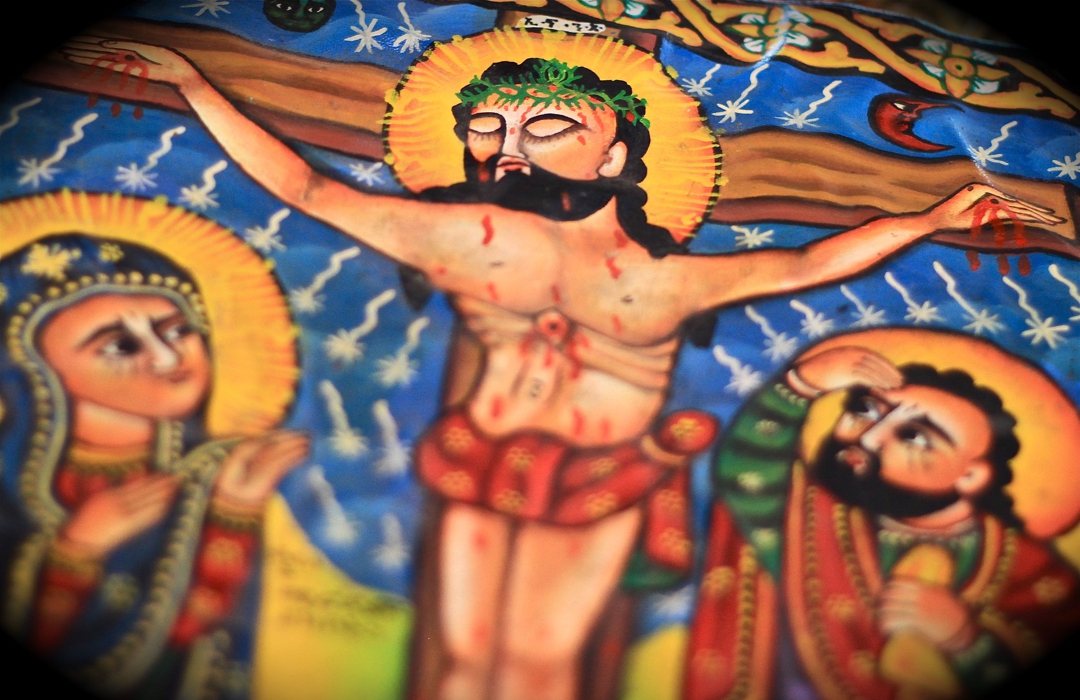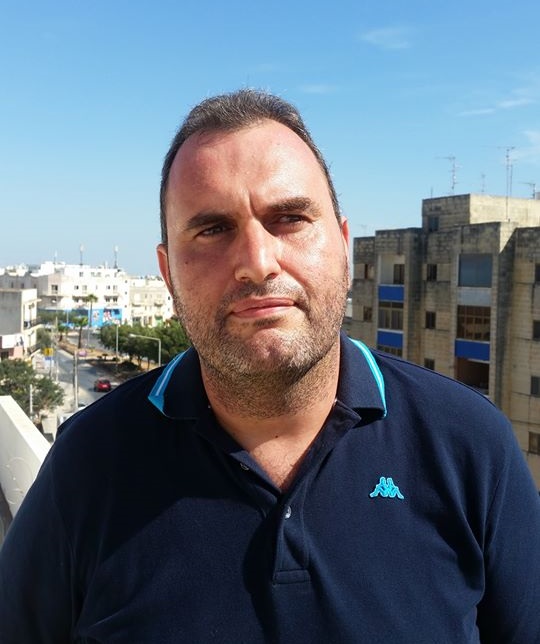
Christ’s Passion should encourage us to be more compassionate to each other and to challenge the status quo.
by Michael Grech & Peter Mayo
Image: Depiction of the crucifixion from a 1,000 year old illuminated manuscript in Axum, Ethiopia by J McDowell / Flickr (Some Rights Reserved)
[dropcap]I[/dropcap]n his book Zealot: The Life and Times of Jesus of Nazareth, the Iranian-American writer Reza Aslan describes Jesus Christ as a rebel and political activist whose proclamation of the coming kingdom of God was a call for regime change, for ending Roman hegemony over Judea and ending a corrupt and oppressive aristocratic priesthood.
As thousands of others in his day, Christ suffered death at the hands of an imperial regime and its collaborators. However, the majority of Good Friday displays in Malta showcase the splendour and the glory of the Roman Empire, rather than the suffering it brought onto the territories it occupied, including the present-day Palestine.
Given the political historical context of the Christ’s era, Good Friday displays could direct our attention to the contemporary scenarios of imperialism and colonialism: global capitalism with its colonial foundation and the plight of immigrants who are the victims of a lasting colonial legacy. The Palm Sunday processions organised by Maltese and immigrants at Ħal Far, and the Lenten Talks addressed by migrants at the University’s Junior College a few years ago, attempted to re-establish the links between the victims of colonialism in Christ’s days — including Jesus himself (who was both a victim of colonialism and, as a child, an immigrant in Egypt) — and some of its contemporary victims, the migrants.
The Holy Week activities are performed in a theatrical manner, hence, they attract a large number of spectators. We can see the gruesome spectacle of flashing whips and an armoured Roman legion accompanying the defenceless Christ together with two ‘thieves’ to their execution.
These events could encourage us to question the unjust power of rulers which drives people into poverty and then sanctions imprisonment and executions for simply stealing food.
These events could encourage us to question the unjust power of rulers which drives people into poverty and then sanctions imprisonment and executions for simply stealing food. We can interpret the Good Friday narratives and the public executions it features in this way: people who could not afford to buy Roman citizenship, innocent people, were sacrificed on the altar of political convenience. This was the manner in which those who held the power responded when someone dared to challenge their authority.
A pledge for gender equality could also be encoded into the story of Christ’s Passion. Though the main character of the Passion is Jesus, it also involves a number of female protagonists.
One of them, Mary Magdalene, was the first to witness Christ’s resurrection. This was a progressive notion which challenged the Jewish practices of not recognising testimonies offered by women. There is mileage here for discussions concerning the historical status of women and citizenship throughout the years. The female protagonist of the Maltese Easter celebrations is Our Lady of Sorrows — the Mater Dolorosa. In the suffering of Jesus’ mother, believers can recognise the distress of our contemporaries who are passing through hardship.
Mary Magdalene was the first to witness Christ’s resurrection. This was a progressive notion which challenged the Jewish practices of not recognising testimonies offered by women.
The Mater Dolorosa feast and other Holy Week events tell of women’s suffering, strength and hopes. The Valletta procession attracts a large crowd even including suffering women who worked as prostitutes. In Cottonera and other Maltese regions, this events encourage us to sympathise with Cottonera women in a not too distant colonial past, when their lives were reduced to performing laundry for British sailors for a pittance and prostitution to serve the Garrison’s needs. Often, these women were young widows whose husbands died in fatal accidents during work aboard HMS ships at sea or in the docks.
Finally, Good Friday events with their exuberant colourful aesthetics can encourage us to view the art critically, through a social prism. The colourful spectacles of Holy Week can inspire us to connect to the events they portray through recognising their symbolic meaning such as the experiences and struggles that occur in localities, communities in Malta and the world.
![]()
This article is an excerpt of an academic paper on the Passion of Christ, Popular Education and Politics which the authors are in the process of finalising.
![]()
 Michael Grech teaches philosophy at the Junior College of the University of Malta. He writes sporadically in local newspapers.
Michael Grech teaches philosophy at the Junior College of the University of Malta. He writes sporadically in local newspapers.
Peter Ma yo is Professor at the Department of Arts, Open Communities and Adult Education, Faculty of Education, University of Malta. He is also a member of the Collegio Docenti for the doctoral research programme in Educational Sciences and Continuing Education at the Università degli Studi di Verona. From October 2016 till September 2018, he is Visiting Professor at the Institute of Education, UCL, London.
yo is Professor at the Department of Arts, Open Communities and Adult Education, Faculty of Education, University of Malta. He is also a member of the Collegio Docenti for the doctoral research programme in Educational Sciences and Continuing Education at the Università degli Studi di Verona. From October 2016 till September 2018, he is Visiting Professor at the Institute of Education, UCL, London.

Leave a Reply